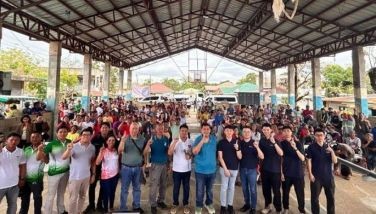Revolution

June 15, 2006 | 12:00am
I am not quite sure if this is a generational thing.
Lately, I’ve noticed that more and more of my friends have gone into farming – not as an alternative means of livelihood, but as an alternative lifestyle.
These friends of mine have gone through rewarding yuppiehood. They have done well in the city as professionals and entrepreneurs. They are financially secure.
They do not go into farming to supplement their urban incomes. For nearly all of them, running a farm is an operational loss – especially if you count in the SUVs they acquire to do farming. They are into it with a sense of great mission or a great sense of pleasure.
At least two of my friends have rescued idle family plots and planted them to traditional varieties of aromatic rice – the sort regular farmers have abandoned because they yield so little per hectare. My friends are, therefore, subsidizing their agricultural pastime hugely. To top it all, they do not even sell the rice they harvest. They give away the rice as truly special gifts to friends.
Most of my born-again farmer friends are into orchards. They have filled family-sized plots with fruit-bearing trees, carefully cross-cropping to get the most yield from every unit of land without exhausting the soil. They hire consultants to teach them how to go about their farming and fenced off their plots to protect their precious crops. They import topsoil at huge expense when necessary to guarantee the quality of their harvest.
Then they give away the fruits of their "investments" – having them delivered door-to-door on expensive pick-up trucks.
Having become an increasingly frequent beneficiary of the largesse of friends who have become born-again farmers, I decided to investigate this phenomenon more systematically.
My instincts as a social scientist tell me there is a significant economic phenomenon happening here. My friends are flouting the most basic rules of every economic endeavor: which is to recover investment and make a profit. My friends are investing in their agricultural and fisheries enterprises much more than they intend to recover.
And they are happy to do it, blessed at taking the operational loss.
My casual investigation has yielded the following observations.
First, all my born-again farmer friends have ample disposable incomes from their day jobs. They have decided to put away part of that income to "invest" in projects of long-gestation such as planting mango trees.
Second, a great number of them discovered their families had idle "family-sized" farm lots in the wake of our badly-designed land reform program. Those pieces of land could not support a family if that family solely depended on agricultural income. Rather than let an asset they could not sell go to waste, they decided to plant orchards and nurse gardens. Some of them hired heavy equipment to make artificial ponds and improve water containment.
Third, those who did not inherit family-sized plots bought idle agricultural land that was being sold cheap because no one wanted to plant them.
These observations lead me to a provisional conclusion: the revolution in our agriculture is now being led by accidental farmers – those with enough to capitalize the land and plant crops with long gestation periods precisely because they do not need to subsist on agriculture.
I have always thought that the malaise of our agriculture is that it is undercapitalized. The agrarian reform program aggravated that malaise by discouraging capitalization of increasingly scarce arable land: forbidding the use of transferred land as collateral and putting restrictions on the sale of those small plots.
For the large plantations of low-value crops, there is what might be called the "Danding Cojuangco model" in Negros. There, former sugar land was planted to tens of thousands of mango trees around a large man-made lake. The trees are attended to by a scientifically trained team and the scale of the plantation is such that the crop had great commercial promise.
But what happens to the small family-sized plots that could not be integrated into commercially viable scale because of the bad design of our land reform program? Many of them have been left idle because it is uneconomic to continue to till these small plots.
Into that economic vacuum, it appears, the yuppie farmers have poured in to rescue our agricultural production from the mess land reform created. That, I think, is the historical condition that explains why more and more of us are getting boutique agricultural produce as gifts.
Apart from going into direct farming, some my friends have boarded the crest of new lifestyle trends by investing in the production of virgin coconut oil, spas that have opened employment opportunities for our hilots and arbularyos, furniture exports that use indigenous plants and the production and trading of both local and foreign wines.
Of the latter case, my hero is Guido Delgado. The former president of Napocor earlier set up a company that managed small hotels in some of our principal tourist destinations. Now he has formed a partnership with the Spanish company Bodegas Hidalgo La Gitana to market brandy, sherries and wines to the entire Asia Pacific and Commonwealth region.
The Hidalgos is one of the last families to produce and market unblended solera sherries in the closest Jerez vineyard to the sea. Its wines and brandies are produced from unique Palomino grapes located in the chalky soil of the Sanlucar vineyard where the Guadalquivir River meets the ocean.
Bodegas Hidalgo de Filipinas, a Filipino-Spanish venture is now marketing a rich range of brandies, sherries and wines in the country. A few weeks ago, Guido gathered friends from our Pagbabago movement to sample the range of Hidalgo wines and brandies.
That was as good an excuse as any for the good comrades from Pagbabago, pulled apart by the political tensions of the past year, to continue our running conversation on our nation’s life. The wines were beautiful even as, expectedly, the conversation was still dangling.
Which is tolerable. Our lifestyle and the investment choices we make is our revolution.
Lately, I’ve noticed that more and more of my friends have gone into farming – not as an alternative means of livelihood, but as an alternative lifestyle.
These friends of mine have gone through rewarding yuppiehood. They have done well in the city as professionals and entrepreneurs. They are financially secure.
They do not go into farming to supplement their urban incomes. For nearly all of them, running a farm is an operational loss – especially if you count in the SUVs they acquire to do farming. They are into it with a sense of great mission or a great sense of pleasure.
At least two of my friends have rescued idle family plots and planted them to traditional varieties of aromatic rice – the sort regular farmers have abandoned because they yield so little per hectare. My friends are, therefore, subsidizing their agricultural pastime hugely. To top it all, they do not even sell the rice they harvest. They give away the rice as truly special gifts to friends.
Most of my born-again farmer friends are into orchards. They have filled family-sized plots with fruit-bearing trees, carefully cross-cropping to get the most yield from every unit of land without exhausting the soil. They hire consultants to teach them how to go about their farming and fenced off their plots to protect their precious crops. They import topsoil at huge expense when necessary to guarantee the quality of their harvest.
Then they give away the fruits of their "investments" – having them delivered door-to-door on expensive pick-up trucks.
Having become an increasingly frequent beneficiary of the largesse of friends who have become born-again farmers, I decided to investigate this phenomenon more systematically.
My instincts as a social scientist tell me there is a significant economic phenomenon happening here. My friends are flouting the most basic rules of every economic endeavor: which is to recover investment and make a profit. My friends are investing in their agricultural and fisheries enterprises much more than they intend to recover.
And they are happy to do it, blessed at taking the operational loss.
My casual investigation has yielded the following observations.
First, all my born-again farmer friends have ample disposable incomes from their day jobs. They have decided to put away part of that income to "invest" in projects of long-gestation such as planting mango trees.
Second, a great number of them discovered their families had idle "family-sized" farm lots in the wake of our badly-designed land reform program. Those pieces of land could not support a family if that family solely depended on agricultural income. Rather than let an asset they could not sell go to waste, they decided to plant orchards and nurse gardens. Some of them hired heavy equipment to make artificial ponds and improve water containment.
Third, those who did not inherit family-sized plots bought idle agricultural land that was being sold cheap because no one wanted to plant them.
These observations lead me to a provisional conclusion: the revolution in our agriculture is now being led by accidental farmers – those with enough to capitalize the land and plant crops with long gestation periods precisely because they do not need to subsist on agriculture.
I have always thought that the malaise of our agriculture is that it is undercapitalized. The agrarian reform program aggravated that malaise by discouraging capitalization of increasingly scarce arable land: forbidding the use of transferred land as collateral and putting restrictions on the sale of those small plots.
For the large plantations of low-value crops, there is what might be called the "Danding Cojuangco model" in Negros. There, former sugar land was planted to tens of thousands of mango trees around a large man-made lake. The trees are attended to by a scientifically trained team and the scale of the plantation is such that the crop had great commercial promise.
But what happens to the small family-sized plots that could not be integrated into commercially viable scale because of the bad design of our land reform program? Many of them have been left idle because it is uneconomic to continue to till these small plots.
Into that economic vacuum, it appears, the yuppie farmers have poured in to rescue our agricultural production from the mess land reform created. That, I think, is the historical condition that explains why more and more of us are getting boutique agricultural produce as gifts.
Apart from going into direct farming, some my friends have boarded the crest of new lifestyle trends by investing in the production of virgin coconut oil, spas that have opened employment opportunities for our hilots and arbularyos, furniture exports that use indigenous plants and the production and trading of both local and foreign wines.
Of the latter case, my hero is Guido Delgado. The former president of Napocor earlier set up a company that managed small hotels in some of our principal tourist destinations. Now he has formed a partnership with the Spanish company Bodegas Hidalgo La Gitana to market brandy, sherries and wines to the entire Asia Pacific and Commonwealth region.
The Hidalgos is one of the last families to produce and market unblended solera sherries in the closest Jerez vineyard to the sea. Its wines and brandies are produced from unique Palomino grapes located in the chalky soil of the Sanlucar vineyard where the Guadalquivir River meets the ocean.
Bodegas Hidalgo de Filipinas, a Filipino-Spanish venture is now marketing a rich range of brandies, sherries and wines in the country. A few weeks ago, Guido gathered friends from our Pagbabago movement to sample the range of Hidalgo wines and brandies.
That was as good an excuse as any for the good comrades from Pagbabago, pulled apart by the political tensions of the past year, to continue our running conversation on our nation’s life. The wines were beautiful even as, expectedly, the conversation was still dangling.
Which is tolerable. Our lifestyle and the investment choices we make is our revolution.
BrandSpace Articles
<
>
- Latest
- Trending
Trending
Latest
Trending
Latest
Recommended























